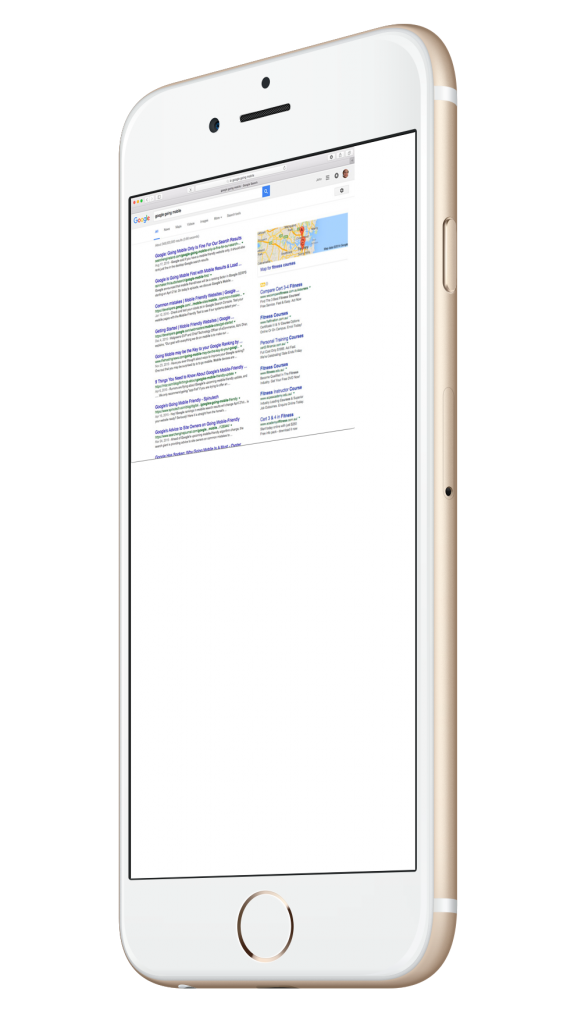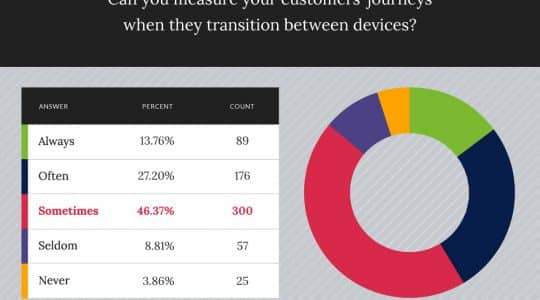There has been quite a bit of marketer hand-wringing and worry about Google’s big recent change: removing ads from the right side of search engine results pages. Prices will likely go up, and probably already have. Organic results might get fewer clicks, and there will be more competition for the few top slots.

Nope: right side ads don’t really work on mobile …
What’s really happening here?
Google is going mobile-first in what was once its most desktop-oriented product: search. Facebook had its mobile watershed moment years ago, and now its revenue is 80% mobile. Google was a bit later to the game, but it is now laser focused on mobile in everything it does.
And while Google doesn’t break out revenue the way Facebook has, we do know that more than half of its queries are on mobile and have been since last year. Since its revenue continues to grow at between 15% to 25% per year, Google is clearly doing something right in migrating its cash cows to mobile.
Not shockingly, the Android operating system maker knows a few things about the subject … and this is just one more sign that everything at Google is being developed with a mobile-first perspective.
Interestingly, an entire industry that grew up in the era of desktop search — search engine optimization, search engine marketing, pay-per-click, and more — is having to undergo the same change. In some cases, there’s no obvious corollary in a mobile-first world, and companies like Flipkart are reinventing marketing and commerce for our small, hand-held devices.
If you’re still a desktop-primary marketer, however, there’s no immediate cause for panic, says Wordstream CEO Larry Kim:
“Many advertisers are concerned about huge CPC increases,” he says. “My message to you is simple: Keep calm. I foresee no big changes in auction dynamics (CPCs, impression volume, etc.) because the changes are so perfectly balanced.”
There is one clear loser he mentions, and that’s organic search, which is getting pushed farther down the page. That’s a potential problem for consumers, and it’s a potential problem for search engine optimizers, who are competing for a smaller piece of a smaller pie. (Truth be told, however, old-school search is transforming into a voice-driven, always-on, intelligent agent kind of thing a la Siri, Cortana, Alexa/Echo, and, of course, Google Now.)
But in addition to the loser, there’s also a clear winner: mobile users.
Mobile and desktop search engine results will look more similar, meaning there will be a cleaner and more consistent Google experience. And the user experience is being optimized around mobile, which means that we’ll have better, faster, cleaner — and more readable — access to Google’s results wherever we are.
All of which is just one more sign that Google is all-in on mobile.
Like this article? Sign up for our blog digest emails.
Author
Before acting as a mobile economist for TUNE, John built the VB Insight research team at VentureBeat and managed teams creating software for partners like Intel and Disney. In addition, he led technical teams, built social sites and mobile apps, and consulted on mobile, social, and IoT. In 2014, he was named to Folio's top 100 of the media industry's "most innovative entrepreneurs and market shaker-uppers." John lives in British Columbia, Canada with his family, where he coaches baseball and hockey, though not at the same time.




“Mobile economist” LOL. What is the next buzzword? Guy who writes an article based off the data his engineers provide him?
Yeah, I know, a little over the top. What can I say … guru, ninja, wrangler, and all the other cool titles were taken 🙂
Seriously, the job is really simple: learn and share.
In terms of data, yup, I do get a lot of data from our great engineers, but even more from our data scientists in our BI division. This article wasn’t based on that, but many of our research insights are.
Have a great day!